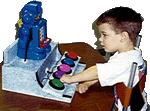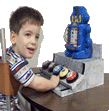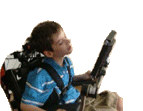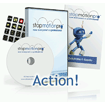Information on IEP, academic standards, functional assessments, & meetings and inclusion tips
| Item # |
Product Description |
Photo |
Price |
|
AC-AI02
Details
|
Aligning IEPs to Academic Standards
For students with moderate to severe disabilities
With increased emphasis on students meeting state academic
standards, instructors of students with moderate and severe
disabilities have wondered about their role. Will they continue to
integrate their students in the regular classrooms and in the
general curriculum? Or will their participation in alternate
assessments aligned to alternate achievement standards leave them
stranded in self-contained classrooms once again?
|
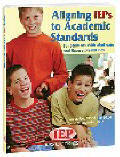
|
|
|
AC-IP07
|
Better IEP Meetings
Foster positive communication with families and
other IEP team members and ensure FAPE provisions
Regular IEP Meetings can provide reassurance for everyone involved, or they can
cause negative feelings and cause participants to lose confidence in the IEP
process. In their new book, Drs. Cynthia Herr and Barbara Bateman carefully
consider how to make your IEP team meetings better.
The 3 stage framework
- Preparing for the meeting
- Conducting the meeting and developing a legal and educationally sound IEP
- Ensuring the provisions required by FAPE are implemented after the
meeting
A great book to help you foster positive communication with families
and other IEP team members.
Softbound, 124 pp, 2005.
|
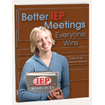
|
|
|
AC-IP05
Details
|
Better IEPs
A guide to legal understanding of IEP meetings
A newly revised and enhanced edition of the ultimate guide to
understanding IEPs from a legal standpoint, complete with IDEA 2004
updates. A classic in its field, Better IEPs presents a focused,
3-step process that zooms in on the individual student and
dismisses out of hand the one-size-fits-all approach that is too
often mistaken for proper procedure in today's schools. Written by
Dr. Barbara Bateman, an attorney and professor emeritus and the
number one expert on IEP law in the nation, and coauthored by Mary
Anne Linden.
Softbound book, 276 pp, updated 2006.
|
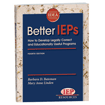
Details
|
|
|
AC-EP02
Details
Sample
|
Building Electronic Portfolios
Teach students to get involved in their own IEPs
Students today are being encouraged by IDEA updates to get involved
in their own IEPs. Here's a simple way to teach them how to make
their own electronic portfolios so they can achieve that goal in
impressive fashion.
Students learn to create attractive presentation software slides
about their work experiences, skills, interests and accomplishments
to show at IEP meetings, to classmates or prospective employers.
Authored by Professor Susan J. Glor-Scheib of the Indiana University
of Pennsylvania.
Contents
- Covered spiral bound book, 90 pp 2006
- Win/Mac CD with printable PDF.
ISBN 1-57861-588-7
|

|
|
|
AC-IP25
|
From Gobbledygook to Clearly Written Annual Goals
Writing clear, measurable annual IEP goals is a difficult skill to
master. The good news is that goal writing is easy once the steps
are revealed. In her latest book, Dr. Barbara Bateman takes actual
goals, which were poorly written and turns them into productive
ones. You learn to simplify the process by focusing on just four
ideas: Observable behavior, measurable criteria, a given or
condition for success and a final test.
Soft bound book, 140 pp, 2006. ISBN 1-58761-591-7
|
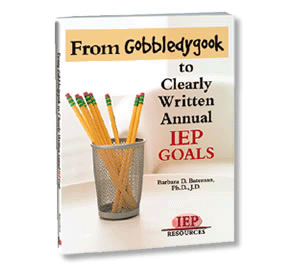
|
|
|
AC-NT02
|
Functional Assessments for the IEP
In this thoroughly researched collection of assessment tools, Dr David
Feldman outlines how functional skills can be integrated into each student's
IEP. Content is divided into these areas: IEP development, curriculum
design, and skill-based instruction. Over50 reproducible assessment tools
are provided with completed examples for staff reference. Includes practical
tools like: IEP Meeting Worksheet. Basic Skill Templates for Literacy, Math,
Safety Skills, and Home Family Interviews- all linked to the IEP.
Contents
Includes a Win/Mac CD with printable PDF. Spiral bound, 212 pp, 2003.
|
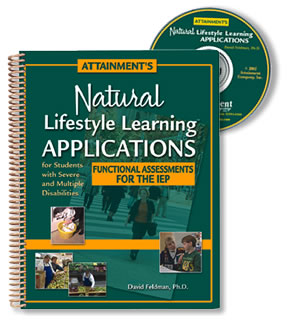
|
|
Versions
Master
AC-TIP02
Handout
AC-TIP01
Package
AC-TIP10
|
IEP and Inclusions Tips for Parents and Teachers
This book features 127 helpful tips focusing on IEP and
inclusion processes. Written from the parent perspective, coauthors
Anne Eason, an inclusion attorney, and Kathleen Whitbread, an
associate professor, look at inclusion research and practice that
help students succeed in and out of school.
Includes chapters on: Getting prepared for IEP meetings, creating
legally correct and educationally sound IEPs, ensuring access to the
general curriculum; tracking IEP progress and forming effective
family/school partnerships. A great way to get parents, teachers and
administrators to have shared goals. Available as Master and Handout
versions plus a Package with one Master and 10 Handouts.
Master/Handout Concept
Master version
- Provides distribution rights (photocopies, email, PDF printouts,
and web posting)
- Includes spiral bound book (8 1/2 x 11 in, 78 pp, 2006) and PDF on
Win/Mac CD
Handout version
- Inexpensive and ready to give to those who benefit: parents and teachers
- Includes soft bound book (6 1/2 x 9 in, 78 pp, 2006)
- NOT AVAILABLE ALONE
Package version
- Includes one Master version and 10 Handout versions
|
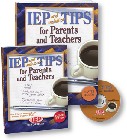
|
|
|
AC-IT02
|
Implementing Ongoing Transition Plans for the IEP
A student-driven approach to fulfill IDEA mandates
This unique and exciting text uses a student-driven approach to fulfill IDEA
mandates. Pat McPartland, a special educator with twenty years classroom
experience, presents a concise yet comprehensive program for
graduation-track special education students. It focuses on the seven areas
mandated by IDEA: Functional assessment, daily living skills, post-school
adult living, employment, community experiences, related services and
instruction. Each area has a sequence of skills and behaviors written as
objectives that teachers, parents and students review for inclusion in the
IEP. A ready-to-go, yet easy to personalize pre-IEP assessment starts the
process. A gem of a book for any secondary special education teacher or
administrator. Spiral bound, 132 pp, 2004.
|
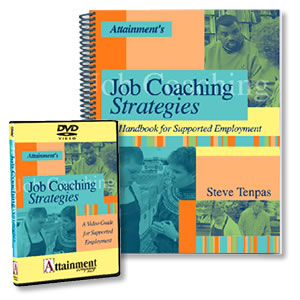
|
|
|
AC-IP14
Details
|
Organizing your IEPs
Format for scheduling and implementing IEPs for all staff
As instructors you have become increasingly swamped with IEP-related
paperwork in recent years, often putting you in the awkward situation of not
having adequate time to do what you were hired to do, TEACH to the student's
IEP. Author Shelley Peterman Schwarz and professional office organizer Nancy
McKinney have collaborated on a book that will help you take back control of
the IEP organizational process and will allow you to spend your primary time
actually teaching to student IEPs. It includes sections on organizing your
paperwork, collecting data, tracking annual IEPs and three-year
reevaluations, and organizing an electronic file system.
Includes a Win/Mac CD with a printable PDF that
contains all the reproducibles in the book. Softbound, 98 pgs., 2005.
|
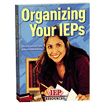
|
|
|
AC-TX02
|
Test Anxiety: A Practical Guide
For all staff involved in the IEP process to reduce student stress on test
performances while raising success rates. Address test anxiety in a
practical way that will result in happier students with higher test scores.
Higher standards and greater accountability have brought an alarming rise in
test anxiety, which for some students can lead to a sense of dread and
result in poor test performances. To help students prepare and pass mandated
assessments, you must drill them on facts and give endless practice tests.
But just teaching to the test itself isn't enough. When preparing your
students for high stakes testing you need to help ready them emotionally as
well as academically, because for them these are truly stressful events.
That's what Test Anxiety does. It offers constructive, proven strategies
which identify root causes of test anxiety, reduce physical and emotional
symptoms, and increase student concentration and attention.
|

|
|
|
AC-IP04
|
Why Johnny Doesn't Behave
Write better behavior intervention plans
Features
20 Tips:
Manage student conduct by teaching replacement behaviors for inappropriate ones. All staff K-12.
Focus on 20 tips to help you avoid behavioral problems, including:
Clear class-room expectations; directly teaching expectations; minimizing
attention for minor inappropriate behaviors and attending to behavior you
want to encourage.
FBAs and BIPs
The second section is dedicated to Functional
Behavior Assessments (FBAs) and Behavioral Intervention Plans (BIPs),
beginning with an explanation of each and ending with sample FBAs and BIPs
so you can learn to write your own. Authors Drs. Barbara Bateman and
Annemieke Golly. Softbound, 122 pp, 2003
|
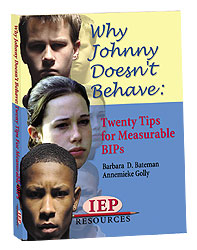
|
|
|
AC-IP02
Details
|
Writing Measurable IEP Goals and Objectives
A guide to quick, effective writing accurate, measurable IEP goals
A guide to quick and effective writing of accurate and measurable IEP goals
and objectives. Many special educators view IEPs as burdensome, but IEPs are
necessary, required by law and when done properly can be extremely helpful
in guiding the student's educational trajectory. The art and science of
writing truly measurable goals and objectives can be mastered so they are
easy to compose, aren't time consuming and can be grasped by all appropriate
staff and parents as well. By two leading special educators and IEP legal
experts, Drs. Barbara Bateman and Cynthia Herr.
Softbound, 136 pp, 2003
|
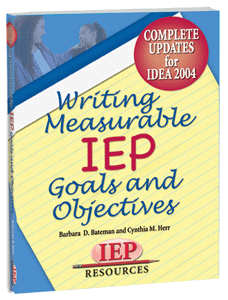
|
|

